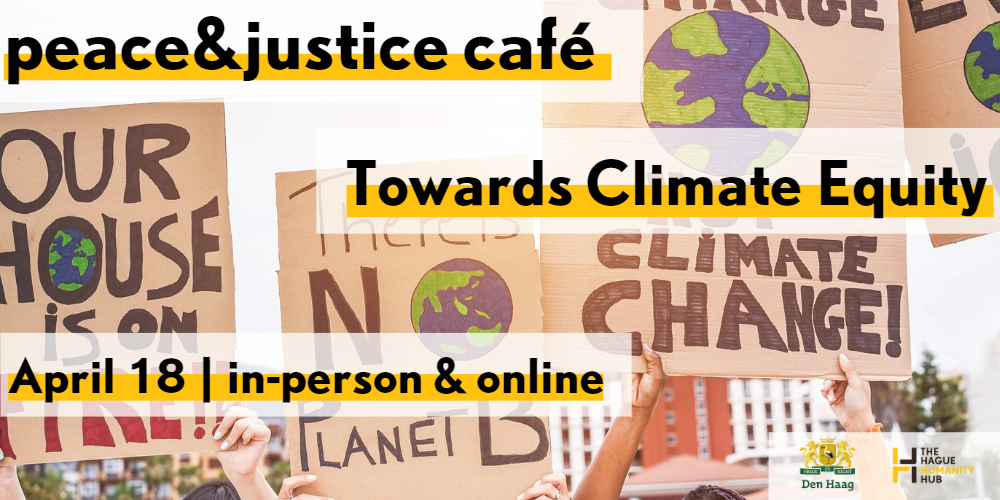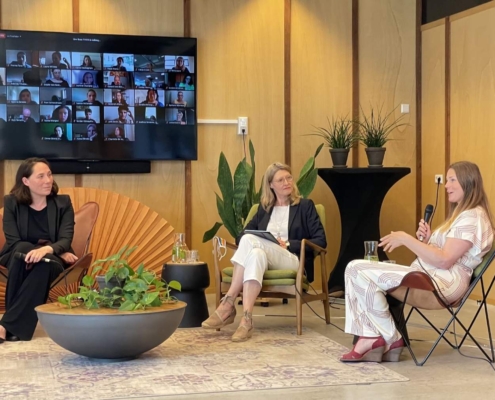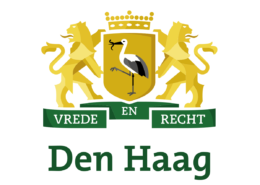Towards Climate Equity – April 18, 2023
“Climate Change is happening now, and to all of us. No country or community is immune. And, as is always the case, the poor and vulnerable are the first to suffer and the worst hit.” – UN Secretary-General António Guterres
The climate crisis is already having huge effects within our world: from governmental changes to business shifts, protests; conflicts, and much more. During discussions about the need for immediate action, it’s often said that humans are driving the climate towards a series of ‘tipping points’; irreversible and critical points of no return.
During the 8th edition of the peace&justice cafe, the Hague community explored the various ways that climate change is affecting lives across the globe, and what needs to be done to keep the crisis form escalating beyond the ‘tipping points’. Are you interested to learn more about what was discussed in the roundabouts? Read the event summary here.
Roundabout information (in-person)
The Hague Academy for Local Governance
Nature-based solutions in cities: equal access for all?
Hosted by Oscar Alvarado
Cities are starting to recognise the many benefits that nature can provide to its infrastructure and people. In particular, nature-based solutions are slowly being adopted to address specific urban challenges. However, the distribution of nature in cities is rarely equal. How can we ensure that nature is more equally distributed across cities, with an emphasis on poorer areas that might be more vulnerable to extreme events? What mechanisms or policies are necessary so that the benefits of nature-based solutions are shared with all communities?
University of Leiden
Peace as an Environmental Security Issue?
Hosted by Tim Wuisman
The problem in the case of Columbia is that the FARC militants occupied the amazon forests for strategic purposes, but unintentionally also protected the amazon rainforest at the same time. With the peace deal in 2016, Colombia has seen a surge of forest razing and land clearance amid continuing unrest in the countryside. In similar cases, how should we approach the protection of the climate in a way that is conducive to peace (state stability) and economic development?
Asser Institute
Using Due Diligence to Pursue Corporate Climate Accountability
Hosted by Dr Virginie Rouas
Companies unquestionably contribute to climate change, and recent years have seen the emergence of initiatives, particularly in the courts, to incentivise companies to mitigate their climate change impacts. Parallel to this trend, due diligence has gained traction since its conceptualization in the UN Guiding Principles on Business and Human Rights. This session will discuss ways to close the corporate climate accountability gap using due diligence. It will be guided by two main questions. First, how can due diligence be used to incentivize companies to reduce their carbon footprint and hold them liable? Second, how can climate activists advocate for greater inclusion of climate change concerns in due diligence legislation under discussion (for example, in the Netherlands or the EU)?
Space 4 Good
Using predictive models to anticipate climate protection needs in vulnerable populations
Hosted by Maxim Malinowsky
Climate change will affect the strength and frequency of storms, flood, droughts, and disease in the future. Preventative action is preferable to disaster response for areas most vulnerable to these shocks, and frameworks for triggering financing are still under development. This roundabout will discuss how earth observation data is utilized for anticipatory climate protection, and how to improve communication between modelers and decision makers.
IDLO
Exploring what works in SDG16 Approaches to Transformative Climate Action
Hosted by Daniel Eggleston
According to the IPCC effective governance leads to more effective and sustainable climate outcomes. This discussion aims to explore what works in promoting feminist, fair and inclusive climate governance, grounded in experiences shared by participants in this roundabout.
International Alert
Connecting the dots: Climate change and peacebuilding
Hosted by Jessica Hartog
Climate change is affecting countries and people across the world, including in fragile and conflict affected contexts. In those contexts capacities to adapt tend to be low which can contribute to further tensions and conflict between population groups and/or vis-à-vis government authorities and businesses. In this roundabout session we will together look at and reflect on these dynamics in different contexts to understand the main climate-related conflict drivers, and we will explore priorities for climate and peacebuilding organisations to address these and support those people in the most climate vulnerable and conflict affected locations.
Jonge Klimaatbeweging
Youth Perspectives in Times of the Climate Crisis
Hosted by Tessa Dool
The well-being of people elsewhere and young and future generations is under stress due to the climate and biodiversity crises. That is why young people all around the world are demanding to be heard. Politicians and policymakers worldwide are listening to the youth, but what do they do with the given information? Are they creating more ambitious policies and transforming entire systems? Or are they maintaining the status quo?
During this session, we will discuss these and more questions on the presence or absence of youth perspectives in the climate debate. The goal is to be honest about the challenges we face, yet hopeful about the possibilities of youth participation in the future.
Netherlands Helsinki Committee
Catalysts of Change: Protecting and Supporting Environmental Human Rights Defenders
Hosted by Aicha Chaghouani and Evelynne Stins
How is climate change related to human rights?
Our session will investigate the relationship between human and environmental rights. We will view this relationship within the context of civic space and human rights defenders, exploring how we can support environmental human rights defenders.
Roundabout information (online)
Environmental Investigation Agency
“Costing the Earth” – Tackling Environmental Crime
Hosted by Julian Newman
Environmental crime (such as wildlife trafficking, illegal logging, and smuggling of climate-changing chemicals) is one of the fastest growing forms of transnational organised crime).Yet despite the impact of these crimes on our planet the criminal justice response remains insufficient.
Challenge: What responses are needed to effectively tackle environmental crime?
Asser Institute
Towards a Climate, Peace and Security Agenda
Hosted by Dr Stavros Pantazopoulos
In the contemporary times of the Anthropocene and the ongoing climate emergency, the multifaceted linkages between climate change and conflict have started to attract the international community’s attention. In a nutshell, conflicts tend to exacerbate existing vulnerabilities relating to climate change mitigation and adaptation, while, at the same time, climate change has been described as a ‘threat multiplier’ or driver of conflicts. Against this background, the present session aspires to explore the value of international law and policy in addressing these challenges. It will further discuss the institutional dimension of these linkages with the ultimate objective of coherently articulating the need of an overarching Climate, Peace, and Security Agenda and the indispensable elements thereof.
The Sunrise Project / Finance Action Organisers’ Network
What’s the connection between big finance, fossil fuels, and civil society?
Hosted by Umme Hoque
The climate crisis is accelerating. And, the move to a renewable future rooted in a just transition is simply not happening fast enough. People all over the world are discovering new ways to campaign together to stop the chaos: following the money and stopping the financing of fossil fuels. Global campaigns are demanding banks, insurance companies, private equity institutions, and other big financial players stop financing fossil fuels. What’s the connection between big finance and fossil fuels? And what role do we all have to address the climate crisis?
PREVIOUS EDITIONS
the future of democracy
peace&justice café
For the fifth edition, we turned our focus to democracy: where it stands, where it’s going, and what can be done to preserve it. Professionals explored how changes in the landscape affect the work of the peace and justice ecosystem, networked with organisations playing a role in determining the future of democracy, and came away with new connections, insights, and goals.
Thursday, 23 June 2022
16:00 – 18:30 CEST
Hybrid (In-Person at the Humanity Hub City Centre, and online on Zoom)
what’s the role of the private sector?
peace&justice café
For the fourth edition, we highlighted the role the private sector can, should, and does play in driving a more peaceful and just world. Professionals of The Hague’s public, private, and non-profit sectors explored how the private sector chooses to respond to these calls and how NGOs, governments, and international organisations can shape this expanded role that they are carving out.
Thursday, 14 April 2022
16:00 – 18:00 CEST
Hybrid (In-Person at the Humanity Hub City Centre, and online on Zoom)
The Hague in the world and the world in The Hague
peace&justice café
For the third edition, we discussed together with professionals from The Hague’s ecosystem what kind of impact The Hague is making in the world, and how the world is represented here in The Hague. Is the international city of peace and justice truly international? How are members of the Hague’s ecosystem focused on making a more peaceful and just world developing partnerships across borders, even during the pandemic?
Thursday, 27 January 2022
16:00 – 18:00 CEST
Humanity Hub via Zoom
where now for climate justice
peace&justice café
For the second edition on November 30, we discussed where we go now in the search for climate justice after COP26. What were the outcomes of #cop26? Did this ‘historic opportunity’ mean that we that we will be able to keep the temperature of the planet under control and limit its increase to 1.5 degrees? Are the promises that governments made on producing less carbon going to reverse the trends?
Tuesday, 30 November 2021
16:00 – 18:00 CEST
Humanity Hub via Zoom
touching base in a shifting world
peace&justice café launch event
For the first edition on June 15, we exclusively spotlighted (Hague-based) female leaders to share their perspectives on how the(ir) world has been shifting. The recent and sustained global upheavals have uprooted societies, disrupted ways of working, and exacerbated systemic inequalities and injustices. How can the Hague community of professionals respond and navigate this shift together?
Tuesday, 15 June 2021
16:00 – 17:45 CEST
Humanity Hub via Zoom






